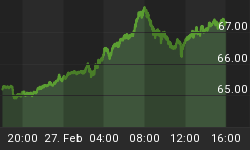Last week, to the delight of its media cheerleaders, the government announced that economic growth had returned and the recession had ended. But before we start celebrating one quarter of modest growth, we should realize the only force driving this apparent recovery is an enormous increase in government spending. To finance its largesse, the government is now borrowing at a rate that has ordinary citizens and the international community extremely concerned.
Leading into the first election season under Obama's reign, this unprecedented government borrowing and spending is creating a false sense of security. The activity has allowed GDP to increase despite stagnation in corporate and consumer spending.
Small businesses - the most important creators of new jobs - are nervous. Due to uncertain economic conditions and a high degree of regulatory uncertainty, they are hoarding cash rather than investing. Indeed, their largest expenditures are often solely to replenish inventories.
Likewise, consumers are rationally hording their resources. Year over year, consumer spending - which constitutes 70 percent of GDP - is essentially flat. With such a large segment of the economy quiescent, the percentage increase in public sector spending has to be very large in order to push the GDP upward.
The new government spending spree has focused on major stimulus initiatives, including the new homebuyer tax credit and 'cash for clunkers'.
Early results are showing that spending on autos dropped to recession-levels immediately after 'cash for clunkers' ended. Meanwhile, some reports are estimating that the program cost $24,000 for every additional vehicle it caused to be sold.
The multi-billion-dollar tax credit for first-time homebuyers juiced real estate sales and provided a strong boost to GDP in the third quarter. But the net result is that many responsible young people, who had chosen to rent and save in the face of a declining housing market, are now saddled with mortgages they cannot afford. These 'homeowners' will quickly join the ranks of the foreclosed.
Perhaps the most concerning aspect of GDP growth is that, even with a deeply progressive Administration spending our children's children's money, the best we can achieve is a modest, fleeting boost in growth. Even the government's biggest apologists have a hard time explaining how these gains can last without continued stimulus. In short, this country is not just bankrupt today, but for generations to come. This is the real truth and should concern those with investments within the United States.
The unhappy situation in America, of which we have long warned, should be contrasted with the healthy growth experiences of other countries such as Australia, New Zealand, China and India.
The Australian central bank is now so confident in its growth potential that it has raised interest rates two months in a row. Though they have a center-left Government, the Aussies have managed to control stimulus spending and overall debt.
New Zealand is seeing an increase in real wages amid a strong Kiwi Dollar. Much more than GDP, this is a signal that economic growth is truly returning to this island nation.
China, a place where 9% annual GDP growth is considered a recession, is still developing its market economy while Obama cripples our own. Much fanfare was showered upon the launch of ChiNext, a stock exchange for privately-owned, small- and mid-cap Chinese companies. It surged in its first day of trading, showing the strength of that economy even outside the State-Owned Enterprise sector.
Finally, there is India. Though still far too closed to foreign investment, this country is making shrewd moves to protect its internal capital. In a deal announced today, India bolstered its gold reserves by 50% by trading $6.7 billion of its U.S. dollar reserve to the IMF. Not only is this a positive sign for India, it is a crushing verdict on our own lauded 'GDP growth.'
A currency's value reflects investors' faith in a particular nation. Though commentators are seizing on this figure or that to make the bull case, the dollar index belies their claims.
Rather than dancing in the dollars falling from helicopters, we should be concerned about their worth when they hit the ground. Unfortunately, fiscal responsibility has moved abroad - and the smart money isn't far behind.
For a more in-depth analysis of our financial problems and the inherent dangers they pose for the U.S. economy and U.S. dollar, read Peter Schiff's 2008 bestseller "The Little Book of Bull Moves in Bear Markets" and his newest release "Crash Proof 2.0: How to Profit from the Economic Collapse." Click here to learn more.
More importantly, don't let the great deals pass you by. Get an inside view of Peter's playbook with his new Special Report, "Peter Schiff's Five Favorite Investment Choices for the Next Five Years." Click here to dowload the report for free. You can find more free services for global investors, and learn about the Euro Pacific advantage, at www.europac.net.















